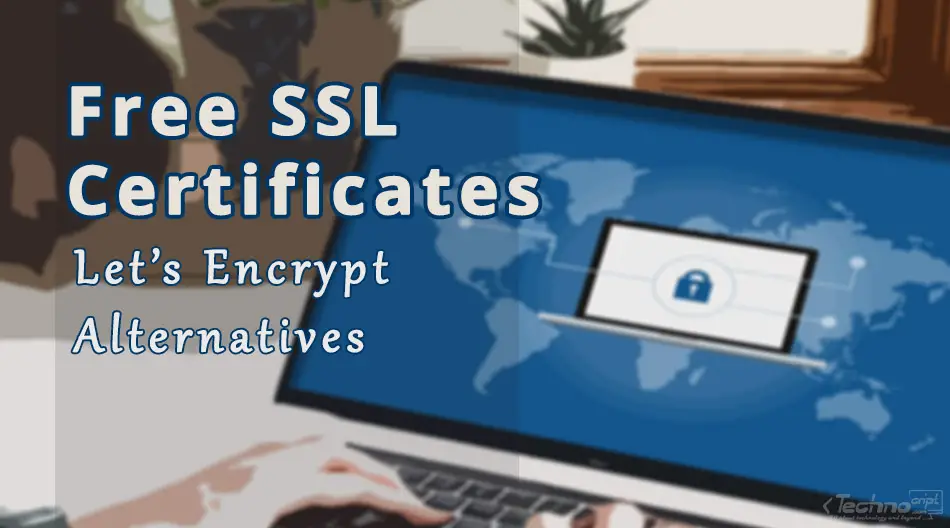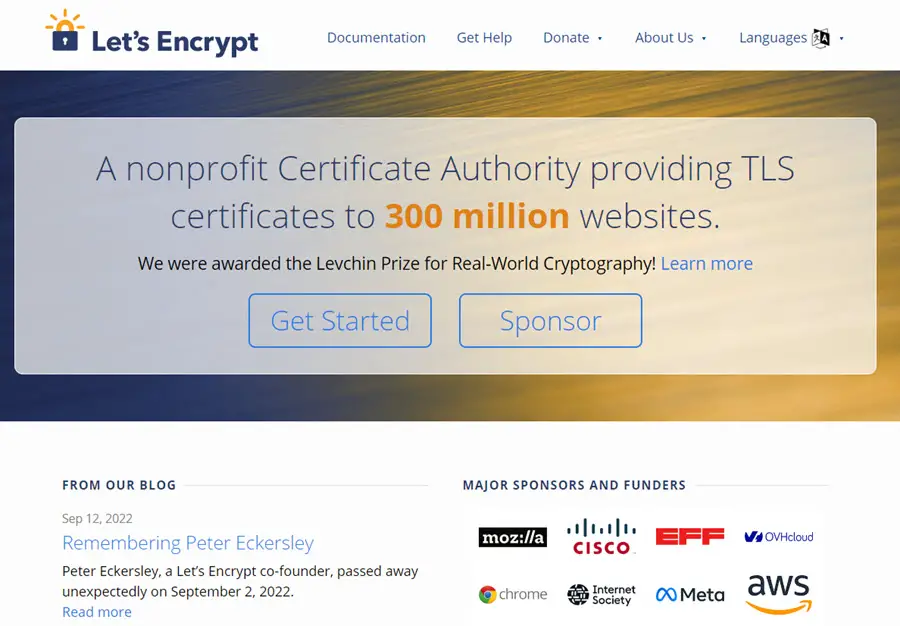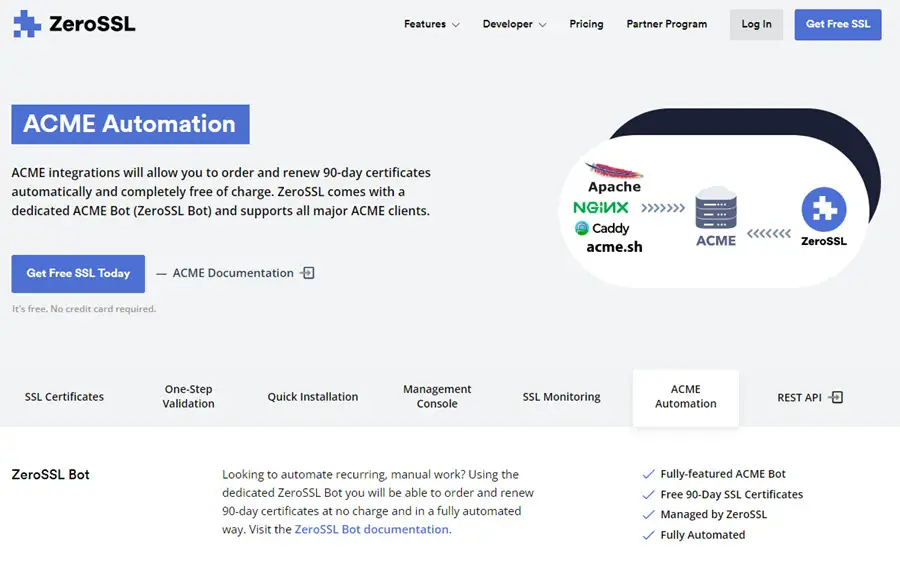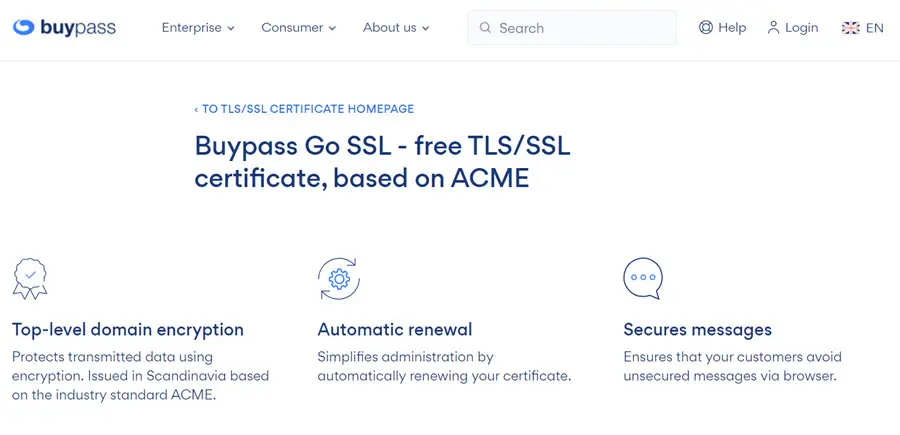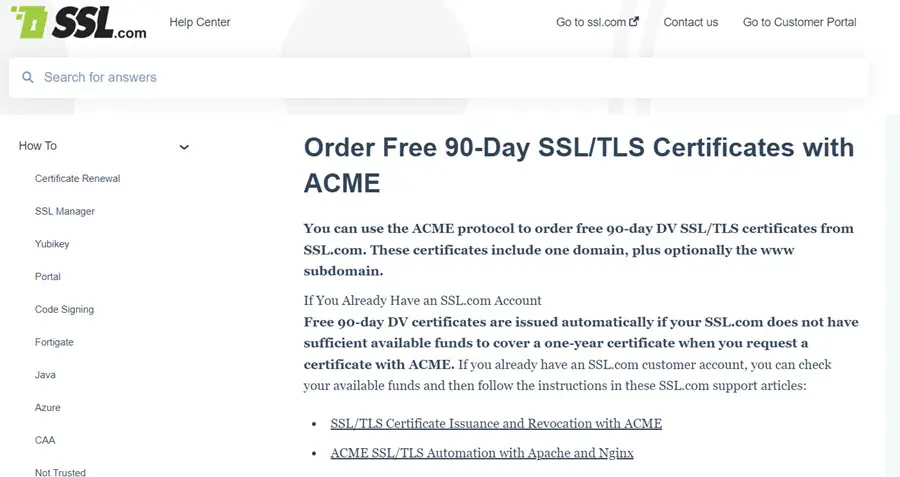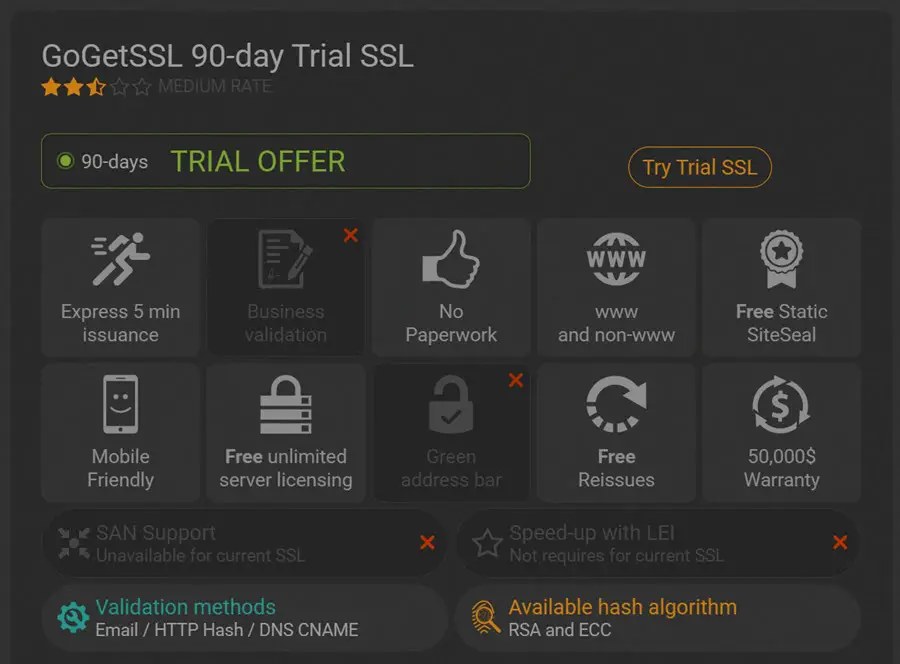Having an HTTPS certificate is the first thing website owners should consider for their websites. It is of paramount importance to secure visitors’ data and protect their privacy. HTTPS is also an effective factor to prove trust and authority for the website and its content.
Installing HTTPS requires obtaining SSL/TLS certificate. This used to be complex and expensive, but thanks to free certificate providers, issuing HTTPS certificates is much easier nowadays.
Let’s Encrypt is an outstanding and very common choice for SSL/TLS certificates. It issues free, reliable, and auto-renewable HTTPS certificates for domains and websites.
However, Let’s Encrypt comes with some limitations, specifically in terms of rate limits, technical support, and the validity of obtained certificates.
Additionally, securing an alternative to Let’s Encrypt (or any other certificate being used) is something that website owners really have to do. Because they shouldn’t rely on a single provider to keep their websites alive. The HTTPS certificate is a single point of failure, and if it failed to validate or renew for any reason, the whole website won’t load properly.
Besides Let’s Encrypt, there is a fairly limited number of alternative free SSL/TLS certificates. Some of them are totally free and pretty similar to Let’s Encrypt but come with advanced features. Others are more advanced but can be issued for free for just a limited time. These free SSL providers are reliable enough to have a backup for our website’s HTTPS certificate.
In this article, we present and compare the top 5 free SSL/TLS certificate providers. In the following table, we compare all certificates in terms of cost, validity, limits, and other details.
Since we do our best to share high-quality content, this post may contain affiliate links that earn us a commission if you act upon clicking on them (i.e. signup, subscribe, make a purchase, etc.). This doesn’t, by any means, impact the experience of our readers.
| Feature / Certificate* | Let’s Encrypt | ZeroSSL | Buypass Go TLS/SSL | SSL.com | GoGetSSL |
|---|---|---|---|---|---|
| Certificate Link | |||||
| Certificate Issuing | Automated (ACME) | Automated (ACME) | Automated (ACME) | Automated (ACME) or Sandbox | Website |
| Certificate Type | Domain Validation (DV) | Domain Validation (DV) | Domain Validation (DV) | Domain Validation (DV) | Domain Validation (DV) |
| Cost (Issuing) | Free | Free | Free | Free (trial) | Free (trial) |
| Cost (Renewing) | Free | Free | Free | Not Free | Not Free |
| Certificate Validity | 90 days | 90 days | 180 days | 90 days | 90 days |
| Rate Limit | 50 Certificates (per Week/Domain) | No Limit | 20 Certificates (per Week/Domain) | NA | NA |
| Multi-Domain Certificates | Supported | Supported | Supported | Not Supported | Not Supported |
| Wildcard Certificates | Supported | Supported | Not Supported | Not Supported | Not Supported |
| More Details | More Details | More Details | More Details | More Details |
* In this comparison, we consider only free/trial versions of the certificates, as features might be different for paid versions when available.
1. Let’s Encrypt
Unsurprisingly, Let’s Encrypt is at the top of our list. Let’s Encrypt is a non-profit organization aiming at eliminating un-secure HTTP protocols and moving toward fully encrypted HTTPS websites.
Let’s Encrypt issues Domain Validation (DV) certificates totally for free. Their certificates are valid for 90 days and can be renewed for free. Let’s Encrypt certificates can be issued and renewed only via ACME protocol, which is usually supported by most hosting providers.
All certificates issued by Let’s Encrypt support multiple domains and wildcards, which allows for securing multiple subdomains in a single certificate. To ensure fair usage for their users, Let’s Encrypt apply rate limits of 50 certificates per domain per week.
As a free and simple solution, Let’s Encrypt doesn’t offer direct technical support. While users can benefit from available documentation and support forums to find answers to their questions.
With more than 300M websites secured by Let’s Encrypt, it is the top provider of totally free but simple HTTPS certificates. However, users might need to check other providers for advanced security levels and packages.
2. ZeroSSL (SSL For Free)
ZeroSSL is the most common alternative to Let’s Encrypt. As it issues domain validation (DV) certificates in multiple versions, one of which is almost identical to Let’s Encrypt.
The initial launch of ZeroSSL was in early 2016 and it has grown since then to be able to currently issue more than 1M certificates on monthly bases.
On their website, ZeroSSL provide both free and paid packages. The free one is limited to 3 x 90-day certificates. While paid plans are monthly/yearly subscription-based, and provide advanced capabilities such as unlimited number of certificates, longer validity, and custom options as per users’ needs.
The most important part of ZeroSSL is the automated ACME integration. Certificates issued this way are identical to Let’s Encrypt certificates. They are totally free, renewable, and can be issued to an unlimited number of domains.
ZeroSSL automated certificates also support wildcard and multi-domain features.
Additionally, ZeroSSL provides some sophisticated features. This makes it easier for both normal and advanced users to issue and manage their certificates. Namely, one-step domain verification via email, certificate issuing and managing via REST API, technical support, as well as an intuitive user interface to take care of and manage obtained certificates.
We have published a detailed comparison between ZeroSSL and Let’s Encrypt certificates, where we help users choose which one better fits their needs. Please feel free to refer to this article for further details.
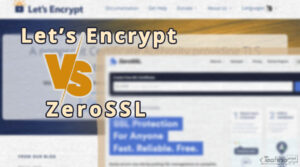
ZeroSSL vs Let’s Encrypt: What to Choose?
In this article, we review and compare both certificate authorities in terms of prices, certificate issuing and validity, limits and renewals, technical support, and many other aspects. Then, we help website owners decide which certificate provider would fit their needs.
Just to mention that SSLForFree.com is another provider of free SSL certificates, but it has become part of ZeroSSL since May 2020.
3. Buypass Go SSL
Buypass is a Norwegian company that was founded in 2001 to provide digital security solutions, including ID and authentication, SSL/TLS certificates, signing services, and secure online payments.
As part of their products, Buypass have multiple options for SSL/TLS certificates. In contrast to Let’s Encrypt and ZeroSSL, available options are not limited to domain validation (DV) certificates, they also issue the advanced Organization Validated (OV) and Extended Validation (EV) types of certificates via paid plans.
In terms of prices, Buypass Go SSL is the only option to obtain a free domain validation TLS/SSL certificate, basically using ACME protocol. Go SSL certificates are totally free, can be issued and renewed automatically via ACME, and their lifetime is 180 days.
That being said, Buypass Go SSL is pretty similar to the free and automated Let’s Encrypt and ZeroSSL certificates. While one bonus for Buypass is that their certificates are valid for double the period.
One downside of Buypass Go SSL is that they don’t offer wildcard support (ex. *.example.com). This means users are still able to combine multiple domains and subdomains in a single SSL certificate, but they need to explicitly define all included subdomains. Additionally, the main limit is 20 certificates per registered domain per week, while other limits are applied in specific cases.
Moreover, Buypass have a useful community for further details about Go SSL and ACME implementation. It covers technical information, discussions, guides, and frequently asked questions.
4. SSL.com
SSL.com is a digital identity and trust services provider. It offers digital certificates trusted by all popular browsers. Besides SSL/TLS certificates, the company offers a wide range of digital security solutions including code, email, client, and document signing certificates.
On their website, SSL.com present multiple options for SSL certificates at different prices and features. All offered certificates are paid and subject to yearly subscription plans.
Nevertheless, there is still an option to obtain free SSL for a period of 90 days with ACME. This certificate is domain validation (DV) and can be ordered using the ACME protocol.
Free ACME certificates may include one domain and the www subdomain. Users have to create a customer account to order free certificates from SSL.com with ACME.
There is also an option to test SSL.com certificates using their sandbox for testing and integration. This is a pretty convenient way for developers to freely experiment with SSL.com services without spending money.
We found some resources telling that the company used to provide free trial certificates on its website. But upon contacting SSL.com, they told us that ACME and the sandbox are the only possible ways to obtain free trial certificates. We would recommend getting in touch with them for more details.
5. GoGetSSL
GoGetSSL is another certificate provider with multiple options for domains, wildcard, multi-domain, and code signing certificates. GoGetSSL is also a store to get SSL certificates from other certificate authorities. It is a digital certificate brand and strategic partner by Sectigo CA.
GoGetSSL has a wide range of SSL security packages all of which are paid. However, there is still an option to obtain a free trial SSL via their website.
The GoGetSSL Trial SSL is a domain validation (DV) certificate valid for 90-days. It can be validated via E-mail, DNS CNAME, or HTTP hash file. It also provides exactly the same features as the paid option. As a domain validation certificate, this one is suitable to protect small websites and projects with no need for higher trust levels.
GoGetSSL domain certificate secures one domain and doesn’t support wildcard certificates. Such additional features are available as paid certificates. For this case, GoGetSSL has the option for a 30-day refund guarantee.
6. Other Free SSL Certificates Providers
The SSL certificate market is rapidly changing. During the search for this article, our team noticed too many examples of entities that used to provide free SSL certificates at some point. Some of them are no longer available or their free options are now paid.
Comodo Free SSL Certificate
Comodo (rebranded to Sectigo) is a cyber-security company used to provide free SSL certificates. Their certificates were valid for 90 days and limited to one issuance per domain.
The free SSL option is no longer available on any of Comodo and Sectigo websites. Nonetheless, their available certificates come with a 30-day money-back guarantee. As mentioned earlier in this article, GoGetSSL is powered by Sectigo and provides free trial 90-day certificates which might be seen as an alternative in this case.
Cloudflare Free SSL/TLS
Cloudflare is a well-known Content Delivery Network (CDN) that manages means to deliver websites fast and securely. They offer free TLS/SSL certificates to their customers included with all application service plans.
This means website owners need to have their websites delivered via Cloudflare network to be able to set up a Free SSL certificate. According to their docs, Cloudflare may issue their certificates from other certificate authorities, such as Let’s Encrypt and Sectigo.
Hosting Providers
As part of their hosting plans, most hosting providers such as Bluehost and Hostinger offer free SSL certificates to their customers. In most cases, the hosting company doesn’t issue the certificate itself, while it relies on other certificate authorities to obtain the certificate.
Besides free SSL certificates, website owners are sometimes able to install paid certificates on their websites from within the control panel. However, the role of the hosting provider here is to just manage the issuance and renewal of the certificate.

